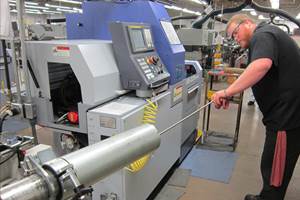5 Topics for Machine Shop Training
These five safety topics should be a focus for your shop’s safety training in 2020, according to Miles Free, director of industry affairs, Precision Machined Products Association (PMPA).
These five safety topics should be a focus for your shop’s safety training in 2020, according to Miles Free, director of industry affairs, Precision Machined Products Association (PMPA). The first four topics are based on top Occupational Health and Safety Administration (OSHA) violations in General Industry. The last topic is often overlooked, Free believes, but is foundational to an effective safety program.
Look for your October issue of Production Machining for the full article on how to make safety a part of your machine shop culture, or check back here on our blog to read the article after Oct. 1.
- Hazard Communication. Employers shall develop, implement and maintain at each workplace, a written hazard communication program that at least describes how labels and other forms of warning, safety data sheets, and employee information and training will be met. This also includes a list of the hazardous chemicals known to be present using a product identifier that is referenced on the appropriate safety data sheet (the list may be compiled for the workplace as a whole or for individual work areas); and the methods the employer will use to inform employees of the hazards of non-routine tasks and the hazards associated with chemicals contained in unlabeled pipes in their work areas. gbm.media/hazard
- Control of Hazardous Energy – Lockout/Tagout. Employers in our industry need to be especially aware of the Minor Servicing Exemption (Kershaw Rule). Visit gbm.media/Kershaw. The employer shall establish a program consisting of energy control procedures, employee training and periodic inspections to ensure that before any employee performs any servicing or maintenance on a machine or equipment where the unexpected energizing, startup or release of stored energy could occur and cause injury. The machine or equipment shall be isolated from the energy source and rendered inoperative. gbm.media/energycont
- Powered Industrial Trucks. Powered industrial trucks (for example, fork trucks, tractors, lift trucks and motorized hand trucks) are ubiquitous in shops. While the current standard focuses on operator competence, the safety of others present in the workplace that could be struck by powered industrial trucks should also be addressed. The employer shall ensure that each powered industrial truck operator is competent to operate a powered industrial truck safely, as demonstrated by the successful completion of the training and evaluation specified in this paragraph. gbm.media/industruck
- Machinery and Machine Guarding — Mechanical Power Presses. Our shops rely on machines using energy to convert raw materials into finished products. Pinch points, physical impact, caught between and entanglement are a few of the hazards for the unwary. In addition to installation and use of proper guarding, inspection and maintenance records are required regularly and periodically to fully meet the requirements of this regulation. It shall be the responsibility of the employer to provide and ensure the usage of "point of operation guards" or properly applied and adjusted point of operation devices on every operation performed on a mechanical power press. The employer shall establish and follow an inspection program. gbm.media/guarding
- Emergency Action Plans. The foundation of a shop’s emergency response should be planned, not improvisational. Who is responsible? Who has authority? Is there a plan? What does it entail? What evidence is there that performers have been trained? An emergency action plan must be in writing, kept in the workplace and available to employees for review. (An employer with 10 or fewer employees may communicate the plan orally to employees.) gbm.media/eap

Related Content
Emerging Leader's Dedication to Education
Instilling confidence throughout a shop floor can do wonders for company morale while increasing productivity.
Read More6 Tips for Training on a Swiss-Type Lathe
There are nuances to training a person to effectively operate a Swiss-type lathe. A shop I visited a while back offers some suggestions.
Read MoreCNC Machine Shop Employment Positions to Consider Beyond Machine Operators
Many machine shops have open machine operator positions to fill. But does it make sense for shops to also seek automation engineers, IT managers and assembly personnel?
Read MoreJob Candidate Questions and What They Tell Us
Individuals who ask thoughtful, original questions in the interview set themselves apart.
Read MoreRead Next
The Importance of Documenting Employee Safety Violations
The burden is on the employer to prove enforcement of the rules.
Read More3 Steps to Safety on the Shop Floor
A few simple strategies can be implemented immediately to get a shop moving in the right direction for a safer company culture.
Read More




.jpg;maxWidth=300;quality=90)













